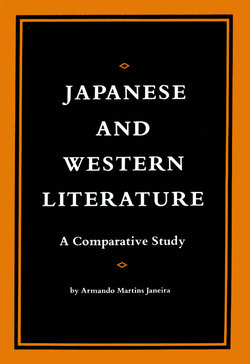Читать книгу Japanese and Western Literature - Armando Martins Janeira - Страница 8
На сайте Литреса книга снята с продажи.
ОглавлениеTABLE OF CONTENTS
Preface
Introduction: On the Universal Nature of Literature
PART ONE. A WESTERN INTERPRETATION OF JAPANESE LITERARY CULTURE
I. CLASSIC POETRY
Introduction to Classic Literature. Form and Content in Japanese Poetry. The Classic Anthologies. The Concept of Poetry. Limitations. Basho: His Symbolic Poetry Confronted with Western Symbolism. The Concept of Nature. The Concept of Love. Significance of Japanese Lyricism in World Poetry.
II. THE CLASSIC NOVEL
The Beginning of the Novel in Japan. The Tale of Genji. The Concept of the Novel in The Tale of Genji and the Western Concept of the Novel. The Concept of Life. The Concept of Love: a Cult of Beauty. The Concept of Time. Two Great Symbols: Genji and Don Juan.
III. THE DIARY
The Heian Diaries. The Diary of Izumi Shikibu. The Diary of Murasaki Shikibu. The Diary of Sei Shonagon. The Notebooks of Kamo no Chomei and Kenko Yoshida. The Poetic Diaries of Basho and Issa. Confrontation with Western Diaries.
IV. THE PICARESQUE NOVEL
A Novel of the People. Saikaku Ihara. Kiseki Ejima. Ikku Jippensha. The Picaresque Novel and Ukiyo-e Painting. The Picaresque Novel in Japan and in the West.
V. THE FANTASTIC STORY
Characteristics of the Oriental and Western Fantastic Story. Akinari Ueda. Bakin Takizawa. The Fantastic Story, Ghost Story, and Murder Story. The Mechanical Void of the Murder Story. The Murder Story and the Nouveau Roman.
VI. DRAMA
Noh, Kabuki, and Puppet Theatre. Drama and Scenic Art. Monzaemon Chikamatsu. The Puppet Theatre. The Weight of Tradition. The Paradox of the Japanese Theatre Today.
VII. THE GREATEST REVOLUTION IN JAPANESE HISTORY: CONTACT WITH THE WEST
First Contact with the West. Second Contact with the West. Enthusiasm for Western Culture.
VIII. WRITERS AT THE TIME OF THE FIRST LITERARY ENCOUNTER WITH THE WEST
Western Influence in the Meiji Era. Ogai Mori. Soseki Natsume. Ryunosuke Akutagawa.
IX. WESTERN INFLUENCE ON CONTEMPORARY JAPANESE WRITERS
A Challenge from the West. Two Main Trends of Thought: Marxism and Christianity. The New Poets: Inspiration from the West. Akiko Yosano. Takuboku Ishikawa. Bokusui Wakayama. The Novelists. Kafu Nagai. Naoya Shiga. Junichiro Tanizaki. Kan Kikuchi. Jiro Osaragi. Kojiro Serizawa. Yoichi Nakagawa. Masuji Ibuse. Yasunari Kawabata. Michio Takeyama. Tatsuo Hori. Fumio Niwa. Fumiko Hayashi. Yasushi Inoue. Shohei Ooka. Osamu Dazai. Taijun Takeda.
X. THE WRITERS OF THE YOUNGER GENERATION
New Social Conditions and Intellectual Trends in Japan. The Modern Poets. Mitsuhiro Sawamura. Ryuichi Tamura. Kio Kuroda. Minoru Yoshioka. Hiroshi Sekine. Ryusei Hasegawa. Taro Yamamoto. Koichi Ijima. Shuntaro Tanikawa. Hiroshi Iwata. The Modern Novelists. Shusaku Endo. Kobo Abe. Yukio Mishima. Yasuko Harada. Shintaro Ishihara. Kenzaburo Oe.
XI. THE UNSOLVED PROBLEMS OF MODERN JAPANESE DRAMA
The Poverty of Modern Scenic Art and Drama. Modern Author-Playwrights. Junichiro Tanizaki. Yuzo Yamamoto. Kan Kikuchi. Hyakuzo Kurata. Jiro Osaragi. Chikao Tanaka. Sumie Tanaka. Tsuneari Fukuda. Junji Kinoshita. Shusaku Endo. Kobo Abe. Yukio Mishima. Attempts to Modernize Noh. The Avant-garde: Modern Abstract Theatre and the Abstract Nature of Noh. (The Theatre of the Absurd: Shuji Terayama, Hiroshi Iwata, Isamu Kurita.) The Musical Review and the Cinema.
PART TWO. ON THE NATURE OF JAPANESE CULTURE
XII. THE EPIC AND THE TRAGIC
Epic and Tragic Vision. The Epic and the Tragic in Eastern and Western Thought. The Epic Poem and Tragedy as Expressions of Action. The Epic and the Tragic in the Light of Buddhist and Christian Thought.
XIII. THE EPIC CONCEPT OF LIFE
Eastern and Western Heroic Myths. Japanese Epic Heritage. Epic Ideals. Lack of Epic Exaltation. The Modern Paths of the Epic. Epic Values in the Modern Novel and Drama. Future Horizons for the Epic.
XIV. THE TRAGIC SENSE OF LIFE
The Nature of Tragedy. The Tragic Vision and Modern Man. The Tragic and the Comic. The Tragic Conflict in Eastern and Western Thought. Characteristic Japanese Elements of the Tragic: Compassion and Evanescence. Aestheticism and Dehumanization. A Special Aesthetic Vocabulary. Aestheticism in Japanese Life: the Floral Art and the Art of Tea. Restraint or human Emotions and Particular Aspects of Humour. Lack of Comedy. Japanese and Western Humanism. The Concept of Life and Death.
XV. CHARACTERISTICS AND TRENDS OF JAPANESE CULTURE
Philosophical Thought. Shintoist Thought. Buddhist Thought. Fusion of Shintoism and Buddhism. Shintoism, Taoism, Confucianism. Man Dissolved in the Universe. Absence of Metaphysical Anxiety: a Passive Pantheism. (Lack of Tension between Good and Evil.) Sin and the Healthy Splendour of the Flesh. A Complex Simplicity. The Traditional Common Denominators in the Modern Arts. Insularity and Imagination. A Christianity Tinged with Heresy. Asia Abandoned—A Future in Europe or America?
XVI. ORIGINALITY OF JAPANESE CULTURE
Chinese Influence and Japanese Cultural Individuality. Originality of Japanese Art. Genuine Japanese Creation. The Sense of Inferiority towards the West as a Challenging Force. Japanese Wisdom and Western Thought. Harmony in Creation.
PART THREE. CONFRONTATIONS
XVII. JAPANESE CLASSIC DRAMA AND EUROPEAN MEDIAEVAL DRAMA
Japanese Classic Drama. European Mediaeval Drama. Parallels. Noh and Morality Plays. Common Points. The Problem of Reality and Unreality. Time, Place, and Action. Satire in the European Mediaeval Farce and in Kyogen. Man's Fate in European Mediaeval Drama. Man's Fate in Noh. Western Mediaeval Theatre, Modern Theatre, and Anti-Theatre. Noh and Metatheatre. Theatre and Poetry.
PART FOUR. HUMAN EXPERIENCE
XVIII. TWO WESTERN WRITERS WHO LIVED WITHIN EASTERN CIVILIZATION
Lafcadio Hearn. Wenceslau de Moraes.
Notes
Selective Bibliography of Japanese Literature in Translation
Index
